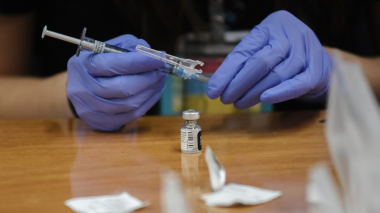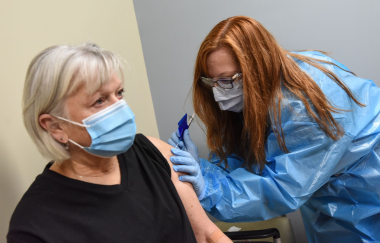Editor's Note: As the coronavirus disease 2019 (COVID-19) pandemic has evolved over the past several months, Atrium Health’s teammates have been on the frontlines, caring for our patients and providing essential assistance in their respective communities. It takes a united effort across our healthcare organization to make this happen, as our teammates still face the same challenges managing their personal lives that we all do. We’re all in this together. So, join us in recognizing these teammates for their ongoing efforts as they offer a look at the COVID-19 situation through their eyes.
While not all COVID-19 patients will have to be hospitalized, the sickest of patients who end up in the ICU will come under the care of physicians like Sailaja Allamneni, MD, a pulmonary critical care physician in Carolinas Medical Center’s Intensive Care Unit.
And bringing comfort to these high-risk patients has been a constantly evolving process, requiring many preparations from clinicians who are readying for more patients than usual, learning about new treatment options and working in shifting environments.
Dr. Allamneni typically splits time providing office consultations and seeing patients in the ICU.
While most of the care she provides is still being conducted on-site, she and her teammates are also using virtual technology to limit visits into the ICU rooms and to provide care without placing themselves at risk and using personal protective equipment. They’re also exploring providing virtual care from a home workstation as an alternative to on-site care.
“While it is inevitable that we all still have to go in the rooms some, we are using virtual care more than we ever have before to check in on these patients and speak to them if they are not intubated,” she says.
Dr. Allamneni is on the Safety Committee that has been working with ICU providers and Infection Prevention to establish Personal Protective Equipment (PPE) guidelines for the ICU. This committee has led efforts to conserve and reuse PPE, and develop new equipment, such as intubation tents and boxes to keep staff safe during higher risk procedures like intubation, where there is a lot of aerosolization.
“The challenge has been the nationwide shortage of PPE, but everybody is working hard to come up with creative solutions to make sure that everybody has adequate protection,” she says. “It has been great to see so much collaboration.”
Since there are no randomized control trials to guide therapy for COVID-19, Dr. Allamneni says a lot of treatment guidelines have been developed by collaborating with physicians around the country. She has used webinars and social media to learn about what other healthcare workers are seeing and what has worked at other hospitals.
“It really is unprecedented in my medical career,” she says. “I think what we are trying to remember amongst all this is we have learned quite a bit over the years about how to support people with viral pneumonias, and most of that still applies here, even though COVID-19 is a brand new disease.”
With anticipated vacations to see her family now interrupted by COVID-19, Allamneni is relaxing by focusing her energies on running outdoors. And since going out to dine is temporarily off the table, she says, “I’m cooking much more now than I ever did before.”
Read more:
Coronavirus from the Frontlines: A Time to Jump In and Help
Coronavirus from the Frontlines: Leading a Response
Coronavirus from the Frontlines: Ensuring Access to Care
Coronavirus from the Frontlines: Bringing the Comfort of Home to Skilled Nursing Facilities



